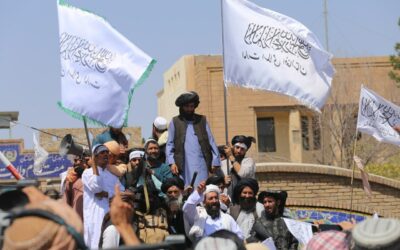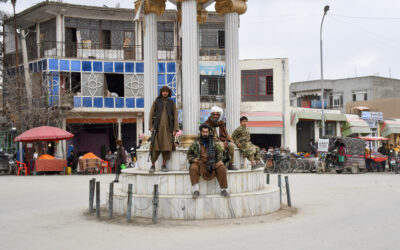OPINION — While all eyes are on developments in the Middle East and the situation between Russia and Ukraine – rightfully so – another country needs some international attention. Several well-connected and well-respected journalists and human rights activists have written articles arguing it is time for the United States to go back to Afghanistan. None are advocating for boots on the ground in the region, but rather for a dialogue with the Taliban-led government in Kabul. I agree. It is time to talk to the Taliban.
More than two years after the U.S. departed Afghanistan, the country is isolated, with the Taliban leading a government which does not allow basic rights for women. Afghanistan is also a society left in disarray with scores of Afghans who were forced to flee their homes, communities suffering amidst starvation, and many left picking up the pieces after several earthquakes in recent months. If this situation continues and the Taliban regime is unable to join the world stage, the implications could be far-reaching. This includes potential impacts for the business community if authoritarian regimes are able to expand their influence in the region, and for Washington and its closest allies if terrorist groups reconstitute and launch attacks from Afghanistan. We are already witnessing China and Russia develop relationships with the Taliban, and terrorist activity stemming from the region with Afghanistan-based ISIS Khorasan’s (ISIS-K) claiming responsibility for the March 22 attack in Moscow that killed almost 140 people, and the attack in Iran earlier this year that left almost 100 Iranians dead.
Grim Past, Unknown Future
I, like many of my former colleagues, felt a profound sense of sadness watching the fall of Afghanistan in 2021. I spent much of my career covering Afghanistan. As an intelligence analyst entering the Central Intelligence Agency a few years after the September 11th attacks, the war in Afghanistan and counterterrorism concerns were front and center for the Agency, and it was a mission I wanted to be a part of. I began my CIA career as a leadership analyst, covering senior political and military leaders and their policies and views towards the United States. I concluded my Agency time as a mid-level supervisor in our counterrorism (CT) Mission Center, covering our CT operations in the region and informing U.S. officials on how best to defeat and dismantle the various terrorist groups operating in the region.
The United States, the international community, and the Afghans gave immense blood and treasure in the 20 years spanning the war, and the statistics are staggering. According to the U.S. Institute of Peace:
- More than 2,300 U.S. servicemen and women were killed;
- 3,917 U.S. contractors and 1,144 allied troops were killed;
- The U.S. government spent $2.3 trillion on Afghanistan, including the building of an embassy in Kabul and various military and diplomatic facilities that now sit empty;
- More than 70,000 Afghan military and police and 46,000 Afghans were killed, as well as 53,000
opposition fighters who were also killed (although these numbers are likely much higher). Pakistan also lost more than 67,000 in relation to the Afghan war.
Now, more than two years later and with an impending presidential election on our own doorstep, shouldn’t we try again with the Afghans – and try something else? Haven’t we learned enough from our mistakes to refocus our efforts not on what Afghanistan should be, but rather what it can become, in an Afghan sense, based on their own value system and norms, and not Western ideals? A nation we can engage with, albeit in a limited and with international pressure, that ideally respects women and ends human rights abuses? A country we can work with to prevent countries such as China and Russia from expanding their influence, and terrorists from regrouping and initiating worldwide attacks?
Human Rights and Humanitarian Concerns
Afghanistan is the only nation in the world that does not allow girls and women to attend secondary school and universities. Afghan girls must withdraw from school after sixth grade, or the age of 13. The Taliban forced the closure of beauty salons and prohibited women from working at non-governmental organizations and entering gyms or public parks. They also shut down most shelters for domestic abuse, which is likely skyrocketing in Afghanistan’s closed society.
Boys are facing an education crisis under Taliban rule as well, according to a UN Human Rights Watch report from December 2023. With women barred from teaching boys, they are often replaced by unqualified male teachers or not replaced at all. According to the Afghan-American women’s rights activist and founder of the nonprofit Afghan Women’s Network, Mahbouba Seraj, “the boys who are growing up in this era, you will not be able to tell them that they have to respect a woman later. They won’t. Even right now, they are not.”
Afghans are also facing severe economic challenges, massive rebuilding efforts following a multitude of disasters including earthquakes, and forced deportations from neighboring countries including Pakistan and Iran. The Afghan government has long depended on international partners to survive, with 75 percent of the government’s funding expenditures covered by grants from international partners following the U.S. invasion in 2001. Although the U.S. has provided more than $1 billion in aid since its departure, these commitments fall short of the country’s humanitarian needs. According to the UNDP, almost all Afghans are now living in poverty and the economy has shrunk by up to 30 percent, with more than 700,000 jobs lost.
One of the deadliest earthquakes to ever hit Afghanistan occurred in October 2023 in the western province of Herat, killing more than 1,000 people. Afghans have faced several earthquakes throughout the country since then, and UNICEF estimates 100,000 Afghan children are in dire need of support.
The country is also facing an influx of more than a million returnees, after Pakistan announced late last year Afghan migrants were no longer welcome. Pakistani officials argue the measure to expel “all unregistered foreigners” is necessary to prevent the influence of terrorist groups operating in the border region, while analysts argue the move is likely due to Pakistan’s deepening economic crisis and an effort to sway public opinion in the lead up to national elections in February 2024.
It’s not just for the President anymore. Are you getting your daily national security briefing?Subscriber+Members have exclusive access to the Open Source Collection Daily Brief, keeping you up to date on global events impacting national security. It pays to be a Subscriber+Member.
Growing Chinese, Russian and Terrorist Influence
China and Russia are among a handful of nations seeking to strengthen their relations with the Taliban. In September 2023, China became the first country to send a new ambassador to Afghanistan since the Taliban takeover. Moscow has invited Taliban officials to economic forums and to discuss joint projects. Analysts perceive China and Russia as trying to play both sides, by not stepping ahead of the international community in dealing with Afghanistan, and working with the Taliban government to ensure militant groups cannot attack Beijing’s or Moscow’s interests while further advancing efforts to obtain valuable natural resources in Afghanistan.
China also accepted the credentials of the Taliban ambassador to Beijing, and the Chinese Ministry of Foreign Affairs spokesperson said that “Afghanistan should not be excluded from the international community.” Nonetheless, he reiterated that the Taliban must form an inclusive government, pursue “moderate and prudent” policies and show a firm commitment to combat terrorism.
Last year, Taliban officials expressed interest in joining China’s Belt and Road Initiative, with the Taliban Commerce Minister stating, “China, which invests all over the world, should also invest in Afghanistan…we have everything they need, such as lithium, copper and iron.” Afghanistan has a wealth of coveted mineral resources and several Chinese companies already operate in the country and have plans to develop a large copper mine.
Despite a shaky past with the Taliban, after the U.S. withdrawal the Russian government decided to maintain its embassy in Kabul, and Russian Ambassador Dmitry Zhirnov became the first foreign diplomat to meet with Taliban representatives. After the meeting, the Taliban began providing security for the Russian embassy. Russian officials have remained sympathetic to the Taliban’s anti-Western rhetoric and concerned about terrorism stemming from Afghanistan.
Moscow is also interested in the Turkmenistan-Afghanistan-Pakistan-India gas pipeline and the Trans-Afghan Railway linking Uzbekistan and Pakistan. Russia has promised to supply Afghanistan with gasoline, diesel, liquified natural gas, and wheat every year, but Taliban sources state their actual deliveries are falling far short of what was promised. The Taliban is also looking for a more cooperative relationship with Moscow, seeking to ease visa restrictions and increase bilateral engagement between the two countries.
Meanwhile, international terrorism experts have long feared that a U.S. departure from Afghanistan will once again allow the region to become a hotbed for terrorist activity. Although there were 75 percent fewer attacks in Afghanistan in 2022 than the year before, likely due to the departure of foreign forces, the Global Terrorism Index continues to rank Afghanistan as the most dangerous nation in the world for terrorism. Many attribute the attacks in Moscow and Iran to ISIS-K, which is largely based in Afghanistan and where a power vacuum is allowing the group to proliferate. ISIS-K was founded by disgruntled members of the Afghan and Pakistani Taliban, inspired by ISIS’ more extreme version of Islam, and encourages jihad across the world. ISIS-K has carried out hundreds of attacks against security forces in Afghanistan and Pakistan since 2017, and was responsible for the deadly attack against U.S. troops in Kabul in August 2021, which killed 13 U.S. service members and at least 170 Afghans.
Although the Taliban has long fought against ISIS-K expansion in Afghanistan as the two groups share an opposing ideology, a 2023 Pentagon assessment found that ISIS-K is using Afghanistan as a base to plan and coordinate attacks across the globe, and the UN claims al-Qaeda and ISIS-K are gathering strength. Taliban officials state they are working to eliminate ISIS-K, and in May 2023, the Taliban agreed to work with Pakistan on improving security along their shared border.
Experts disagree as to whether or not al-Qaeda has reconstituted their strong presence in Afghanistan since the U.S. withdrawal, Nonetheless, the Taliban almost certainly maintains its longstanding ties with al-Qaeda and continues to allow the group to have a presence in the country.
Moving Forward, the Afghan Way
As Kathy Gannon argued in the New York Times earlier this year, the Taliban comes from Afghan society, and while many Afghans likely do not support the Taliban’s restrictive rule, they are the ruling power. Our attempts 20 years ago to impose Western ideals on Afghanistan’s conservative and religious society failed miserably. Seeing the Taliban take over the country so quickly was a punch in the gut, but also not a huge surprise for most who followed the war effort for many years.
Without the support from the international community, the Afghan government was unable to stand on its own. The Afghan military also could not prevent a quick Taliban takeover. The Taliban knew we would eventually leave and we did. In a tribal society such as Afghanistan, they were able to easily take the government back, and any changes we made in Afghanistan were quickly reversed. Wars like the one in Afghanistan are a generational struggle, and despite all of our good faith efforts and well meaning intentions, we could not remain in a country such as Afghanistan for that long without political pressure at home to withdraw and focus on our own domestic policies.
Forming a Western-leaning democracy in Afghanistan was never in the cards. We faced some hard lessons in the past 20 years, so let’s learn from them. The U.S. government needs to find a way to talk to the Taliban in a manner that is less about us and our ideals and more about them. Finding a solution that appeals to all parties is possible, but it takes creativity, understanding, and conversation.
U.S. and allied engagement with the Taliban could allow the international community to encourage the Taliban to continue their fight against ISIS-K in the region, and to not allow ISIS and al-Qaeda to regroup and use Afghanistan as their base for attacks. Historically the Taliban has not supported or been interested in plotting foreign attacks; rather, they have concentrated on ensuring they maintain Afghanistan’s sovereignty and on spreading their conservative and restrictive views of Islam throughout the country. Encouraging the Taliban to prevent the spread of terrorist activity with the carrot of potential future international recognition might encourage them to talk to international representatives and later even work with the international community on counterterrorism operations.
Sign up for the Cyber Initiatives Group newsletter. Better results in cyber require better thinking. Sign up for the CIG newsletter today.
On human rights, U.S. officials expressed their support for the adoption of a UN resolution in late December 2023 to appoint a special envoy for Afghanistan to increase engagement with the Taliban, particularly on issues of gender and human rights. Additional U.S. support for these measures and separate U.S. engagement strategies with the Taliban could help to form the basis of coordinated and structured conversations with the Taliban on key issues including additional rights for women. If U.S. and international officials let the Taliban know they can have a seat at the world table if they provide basic human rights for all of their citizens, allow women to attend school, it could open the door for future engagement opportunities and prospects for a more viable future for all Afghan citizens.
Afghanistan is the home of vast natural resources and is currently closed for business and trade opportunities to most of the world, except for U.S. adversaries including Russia and China. Any hope by the West for future economic relationships with the Taliban-led regime will continue to be dashed if Moscow and Beijing continue to deepen their ties with Taliban officials. A stable Afghanistan will offer both countries a reliable land connection to Iran and the rest of the Middle East, and access to a variety of industries, including mineral exploitation, and oil and natural gas–sectors which offer trillions of dollars of investment opportunities for Moscow and Beijing. By ensuring the Taliban we will not meddle in Afghanistan politics with some assurances from them that any future engagement will include respect for basic human rights and promises of security for any project, perhaps Taliban officials might be willing to discuss future economic stability with U.S. and Coalition partners.
A key question moving forward: will the Taliban even talk to us? An important component of any U.S. strategy in dealing with the Taliban should include communicating with Taliban members who will bring others to the table–more moderate Taliban officials might be our best bet for success, and it is possible U.S. officials are already seeking to establish these relationships. I hope they are.
Rather than allowing countries such as China and Russia to take the lead on engaging with Afghanistan, the United States should seek talks with the Taliban administration to see if we can find some common ground. While we are unlikely to ever see a Western-leaning, democratic government in Kabul, at least not in my lifetime, that is likely OK. Perhaps an Afghan government, even a Taliban-led government, that provides basic rights for its citizens, prevents Chinese and Russian expansion in the region, and does not allow terrorists to gain a foothold in the country, is enough. Or at least it might be enough for the Taliban-led government to gain recognition from the international community. Don’t we owe that to the Afghans and ourselves after two decades of war and instability to give this a try? The future of Afghanistan certainly depends on it, and the world’s own stability and security likely also hinges on it.
Let’s start talking.
The Cipher Brief is committed to publishing a range of perspectives on national security issues submitted by deeply experienced national security professionals.
Opinions expressed are those of the author and do not represent the views or opinions of The Cipher Brief.
Have a perspective to share based on your experience in the national security field? Send it to [email protected] for publication consideration.
Read more expert-driven national security insights, perspective and analysis in The Cipher Brief









